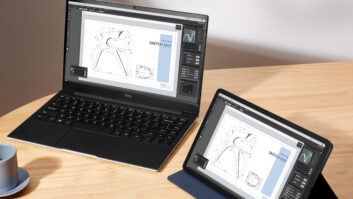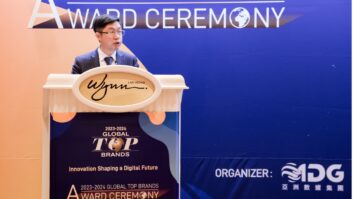NEW YORK –
As 2010 closes, John Shalam, chairman
of Audiovox, is celebrating the 50th year of his
career.
Shalam founded Audiovox in 1965 but his original
foray into consumer electronics was with Custom Imports,
which, in his words, “sold anything and everything.”
One cold December he was able to sell 2,000
car stereos before Christmas. When he got back to
the office from the holidays there were messages from
retailers saying they wanted
more.
At first Shalam said,
“There are no more radios,”
but finally the entrepreneur
in him kicked in and said,
“How many do you need?”
And as the old saying goes,
the rest is history.
Shalam is now a legend
in the CE industry, an active
member of the Consumer
Electronics Association
(CEA) board and was inducted
in the CEA Hall of
Fame in 2009, among many
other honors.
TWICE caught up with him recently to talk about his
career and the industry he loves.
TWICE:
When you first sold car stereos at Custom
Imports were you an electronics guy? Did you like CE
products?
Shalam:
I couldn’t afford to buy any gadgets. I left
school and was barely subsisting. But I loved all types
of electronics. The first home stereo system I bought
was from Marty Gutenplan [of legendary New York retailer
Rabson’s], a Fisher tuner/amplifier with Britishmade
speakers. That was my first first introduction of
really quality sound.
One of the items with Custom Imports that generated
a lot of business was the pocket transistor radio.
We sold a ton of the six-transistor and a ton of the twotransistor
radios to a couple of mass merchandisers.
That was a very nice little business. But the sale of car
radio, that was not by design. A lot of what happened in
my career was by accident, by coincidence, and I happened
to be there, saw an opportunity and moved on it.
I did not get up and get out of school and say, “I’m going
become a major electronics guy” or “learn how to assemble
and ship radios.” I didn’t know anything. I came
out of school, I was starving, stuck with these radios
and had to sell them. That opened the door.
TWICE:
What decision or decisions have you made
that you are most proud of?
Shalam:
I had a comfortable position with Continental
Grain Company, a
commodities trading company.
I made the decision
to leave there and start my
own business. That was
based on my father and all
ancestors were all merchants
in the Middle East,
buying, trading, selling, importing
and exporting products.
Nobody ever worked
for a company. They were all
self-made men and had their
own trading companies. I
guess I must have that in
my blood as well because I
wanted to do something on my own and not be part of
a organization like that. [Editor’s note: Shalam came
to the U.S. from his hometown of Alexandria, Egypt, at
the age of 13 in 1948.]
And that was the decision — to leave a secure, comfortable
job and strike out and do something that was
important for me, that is part of my heritage. That is the
best decision I have ever made, but at the time I regretted
it. I was struggling desperately with no money,
trying sell anything to anybody. You got abused and
kicked around but eventually you persevere. And little
by little you get things to come together.
TWICE:
You have been involved with CEA for some
time. How has your involvement influenced your career?
Shalam:
About 12 or 13 years ago someone suggested
I attend CEA meetings. Bob Borchardt [then of Recoton]
was the CEA chairman then and he established
the first CEA CEO Summit in Bermuda. My wife Jane
and I attended and had a great time, and we met many people there. Later I was told by [current CEA president/
CEO] Gary Shapiro that I was on the board of CEA.
I enjoyed the meetings and listened a lot. I remember
meeting people like Bob, Kathy Gornik [Thiel Audio],
Darrell Issa [founder of Directed Electronics and now
a Republican congressman from California] who became
CEA chairman, Jerry Kalov [then the CEA advisor
and veteran of Cobra and Harman] and Lloyd Ivey
[of Mitek] — really a great group. It is really worthwhile
to meet your peers who run other consumer electronics
companies, whether they were small businesses or
large companies.
It created a lot of opportunities. Pat Lavelle [president/
CEO of Audiovox] and I met Neil Terk of Terk
Technologies and met Bob through CEA meetings and
bought their companies. It was very productive for us.
CEA has been a leading element in my career and life
in last 15 years or so. It has opened my eyes to a lot of
things. It has created a tremendous amount of enjoyment
and participation. I go there because I like meeting the
people, I like learning and listening to the presentations,
and love running the [CEA] Investment Committee.
TWICE:
Who are some of the industry executives
you have met who you have looked up to over the
years?
Shalam:
Jerry Kalov for one. John McDonald, who
headed Casio, he was a legendary guy and I loved to
talk to him, and also Bob Borchardt. I have always respected
Gary Shapiro as well. He has a tremendous
amount of drive and a great enthusiasm. He’s the spark that makes things happen at the CEA. He is the
energy, and I have always admired his ability to communicate
with people, to go to CES and make all these
speeches and introductions … the guy is tremendous.
I met Peter Lesser [of X-10 USA] serving on the CEA
board, and he then became a member of the board
of Audiovox. I have enjoyed a lot of good exchange of
information and advice from Peter, and he has contributed
substantially as well.
At the first CEA CEO Summit in Bermuda I met
Brad Anderson from Best Buy. I was so inspired by
his presentation and impressed with him. Jane and I
also met Dick Schulze [founder of Best Buy] and his
wife. That’s why without CEA I would never have met
people like them, or through the CES keynotes, where
I have had the chance to meet people like Bill Gates
and other impressive people.
TWICE:
What are the most
impressive CE categories Audiovox
has introduced over the
years?
Shalam:
I thought that autosound
was a terrific thing. The
development of autosound from
eight-track to cassette and CD
and all the opportunities was
very impressive.
But what I thought had the absolutely
greatest potential, in my
mind, was car telephones. It blew
my mind completely. Two things
that American men love are cars
and telephones. When the first
carphones came out I told my guys
that we had to get involved in this
business, we had to find a source.
We went to Japan and had
talks with Toshiba and they didn’t
even want to look at me. Finally we convinced them to
give us a chance and bring in some product to begin
our entry into the cellphone business. I thought that
was a very big opportunity.
In cellphones we were competing against Motorola
and Nokia, the big names at the time. You have got to
give credit to Philip Christopher, who worked for us and
now heads PCD. He was such a driving force. He was
enthusiastic and started to promote the phones and to
establish the relationships with the carriers. He gets tremendous
amount of credit for the success of Audiovox. And, course, Pat Lavelle, who continues to date to do
a tremendous amount of work to build up the company.
We have a few more people who have made major
contributions, and I’m not sure I could be the success I
am without putting that team together. Perhaps the key
to my success is to recognize that quality and talents
of the people that can make things happen.
Maybe the most important element of all is having
the people, the second is finding the capital and the
third is finding the product. You can always find product
to sell.
TWICE:
How do you see the CE industry evolving
in the next five or 10 years?
Shalam:
In the next five or 10 years we will see things
that don’t even exist today. The biggest development
of the next few years will be in personal communications.
Instant access to information and entertainment
on devices will expand. People want to be in touch
all the time and they will want to access information,
news, entertainment. You will see a lot more products
of that nature. They may take different forms but it never
ceases to amaze me, on
a daily basis, what you see
coming out with companies
developing more and more
sophisticated products on
a tiny device in your pocket.
The big, big developments
will be in software
and applications. Manufacturing
the products themselves
will become an automated,
routine process.
I think you may see some
of the manufacturing come
back to this country as China’s
employees and other
countries develop higher
labor costs. Manufacturing
has become so much
simpler. I wouldn’t be surprised to see some high-end
manufacturing returning to this country.
TWICE:
So, given the Internet,
social websites and wireless
communications of today,
do you think it would be easier
or harder for an entrepreneur to
create Custom Imports today?
Shalam:
It would be much
easier. There are so many more
opportunities! Look at the number
of companies that have created
apps? Look at all these young
geniuses and what they have created
companies based on these
applications on the Internet.
What I was doing then was the
job of a peddler trying to sell a
product. Today they create products,
create fabulous software
designs that that’s really super
creative, that’s why they are making
a lot of money. If I made $5 on
a car radio back then it was a big deal. Today a good
app you hear 20 million people have downloaded it,
each one paying 5 cents or 10 cents.
TWICE:
What advice do you give young entrepreneurs
you speak to today?
Shalam:
First element you have to have is a vision
and passion to succeed. You have to devote yourself
to your vision. That must be your first priority, to live
and breathe your work, your business and your idea.
You must continue, but you don’t get discouraged.
You are going to have reverses, guaranteed. But you
must keep working, keep pushing and keep plugging
to succeed. The most important is to do the
right thing. Act correctly, maintain your name, your
reputation and your credit so people respect and
trust you.
TWICE:
Are you still excited about this industry,
given the economic times we are going through?
Shalam:
CE is still an exciting industry and still has
an enormous potential. It is very competitive and very
fast moving. But it still provides opportunities for advancement.
Also, not withstanding of all the bashing of America
that is going on, the U.S. is still the greatest country in
the world, in terms of opportunity for people who live
here, or for people who emigrate from other parts of
the world. If you work hard, you apply yourself, there is
no limit of what you can become or what you can do
which is the greatest thing going today. I am a living
example of that.
Shalam
Bio
Experience:
John Shalam
founded Audiovox Corp. in
1965 and currently serves
as its chairman. Audiovox
Corp, is an international
leader in the marketing of
auto sound, vehicle security and mobile video systems
and their related accessories. The company is listed on
the Nasdaq and had sales of $600 million in 2009.
Shalam is a member in the Consumer Electronics Association
(CEA), where he serves on the Board of Industry
Leaders (BIL), and is chairman of CEA’s Investment
Committee. He was instrumental in helping CEA become
an active participant in the Wireless Communications
Industry, establishing the wireless communications division
in 2001, and acting as its first and founding chairman.
Shalam was inducted into the CEA Hall of Fame in
October, 2009.
Education:
Shalam attended the Peekskill Military
Academy in Peekskill, N.Y., and received a bachelor’s
degree in economics from Wharton School, University
of Pennsylvania.
Personal:
He is married to Jane Shalam, with whom
he has three sons: Ari (president of Enterprise Asset
Management, a New York City- based, private real estate
investment firm); David (a VP for the e-commerce division
of Audiovox); and Marc (who works in real estate management
in London). Their primary residence is in Old
Westbury, N.Y.













